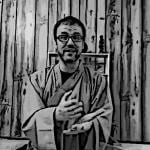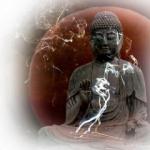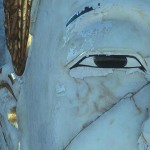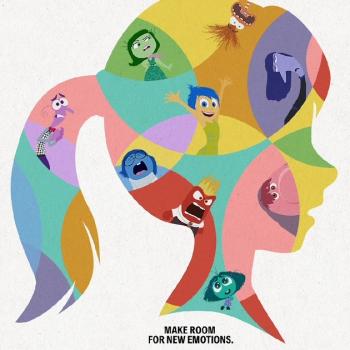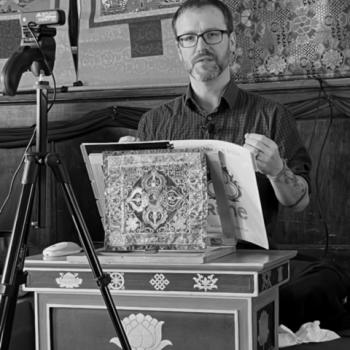I think that at times we get caught up talking about the Buddha too much in Buddhism. I think we need to remember that this isn’t about his spiritual journey, it’s about yours. At the same time, I was thinking about how I’m going to talk about where all of this comes from and I can’t really side-step talking about the Buddha. So I’m going to talk about him, but more importantly I’m going to talk about what he figured out, because it’s what he figured out that’s important.
The Buddha lived about twenty five hundred years ago, give or take, and he came from a really wealthy and powerful family. Some people say the Buddha was a prince, that’s not one hundred percent accurate, but his family was very wealthy and powerful. What he had was everything he ever wanted, he grew up as a spoiled child. He discovered as he entered adulthood that he wasn’t all that happy.
His name, by the way, was not the Buddha. That is a title. His name is Siddhartha Gautama. The Buddha is a title he gave himself, I guess. It means “The Awakened One.” Siddhartha is living in a palace with his parents and he has a beautiful wife, he had an arranged marriage, and he should be happy. He’s got everything, and he’s going to inherit all of his father’s wealth, his father’s kingdom, when his father passes away. So he should be super happy, but he’s not. He’s sort of asking big questions like, “Why do we exist? What’s going on in the world? Who am I?” These big questions that we might wrestle with sometimes.
The story gets told that his father hid from him fundamental realities about life, that he didn’t know about sickness, aging, and death. I don’t think that’s true at all. I think that’s a fictional story that gets told to make the story of the Buddha more powerful. People might be mad at me for saying that, but I don’t think that story’s true at all.
The fact of the matter is, as he entered adulthood, he started thinking, “Why is there suffering and death?” That’s the point. Why is there suffering and death? Why do we struggle so much in our lives? He started asking those kinds of questions. He decided that he could not stay in the palace in this comfortable life because he wanted to find the truth about these things. He was inspired to be a spiritual seeker. He explored the religions of his day a little bit and he didn’t find what he was looking for there.
The religion of his day was kind of hostile to science, mean to minorities, that sort of thing. Really cliquish, and really elitist. Kind of sexist, too. All that sorts of stuff that we wouldn’t want in our religion, right? He was turned off by this, so he abandoned his life. He left the palace and he went to the woods, to the forest, because he heard there were people who were practicing strange religions in the forest. He went there to see if he could find out something, because again, the religion of his day disappointed him.
He goes to the forest and he finds people living in the forest, practicing spirituality, like shamans. Like we might think of hermits you go to the mountain to see. People out there practicing spirituality. They’re doing what would become yoga, and they’re doing other breathing practices, a lot of strange things. He learns a bunch of spiritual practices from some different teachers out there.
Again, to reiterate, he learned from the mainstream religion and didn’t find what he was looking for. So he goes out to the forest and tries to practice kind of the weird religions that people don’t talk about much. And even then, although he felt like he got more benefit from it, he still didn’t find what he was looking for.
So he tried a practice that involved starving himself. Sort of like staying awake for many days and starving himself to try to get some kind of spiritual awakening, and that didn’t work. Ultimately one day, he just sat under a tree and he said, “I’m just going to sit here and I’m going to try to clear my mind. I’m going to try to do these meditation practices, and I’m going to just try to be fully present in my experience, and I’m going to see what happens.”
This is very important, because the one who would become the Buddha, was a regular guy, just like you and me, and he just decides he’s going to figure out realities about human life. That is important because our nature is awakening. His nature was awakening, and he didn’t know that until he started doing a really diligent practice. We have the same nature as him, our nature is awakening, and if we really practice diligently, we can see our true nature, too. Like he did. The story is, he found his true nature, he attained enlightenment. He had lots of adventures, and lots of students, but I’m not going to go into those much.
I want to talk about his teaching now.
The Buddha is sometimes described as like a doctor. That’s because he saw the suffering that we experience in life as like an ailment that needs to be treated. His original core teaching, called The Four Noble Truths, is like a medical diagnosis.
I don’t usually like to talk about the Four Noble Truths, because I think that if people know just a little bit about Buddhism, then they know about the Four Noble Truths, and they might have this misperception that Buddhism is very negative, which it is not. Because the Four Noble Truths are kind of hard to talk about, kind of hard to understand sometimes, I can see why people get that misconception, and I don’t like having to go to great lengths to tell them why Buddhism is not negative.
So I don’t always like to talk about the Four Noble Truths. That being said, here they are.
The first noble truth is that life is bitter and painful. We could also say life is hard. Some people like to say life is suffering. That’s the number one main translation for this word, which is duhkha, that’s the original word. The main translation is “life is suffering,” but we could even say life is uncomfortable. Life is filled with discomfort. Life is uneasy.
The second noble truth is that craving is the cause of our bitterness and hate. Craving. So, what is craving? Craving is wanting things to be different than they are. Not even just wanting, but wanting very hard. Being upset that things aren’t different than they are. That is what leads to suffering.
The third noble truth is that there is a treatment for this. There is a way to manage the bitterness and pain of life.
The fourth noble truth is the treatment, which is the eightfold path.
I want to say, if you don’t like lists with numbers, you’re going to have a tough time studying Buddhism.
The first noble truth is that we have to recognize that we have a problem. Life’s not all sunshine and rainbows, right? Then we need a diagnosis. What’s causing our problem? Can it be that a lot of our problems, a lot of our struggles, are something we exacerbate? We make our problems worse sometimes.
I think in terms of my kids. I tell my kids to clean the basement, they don’t want to clean the basement, they throw a fit about cleaning the basement. They cry, and they yell, and they stomp their feet. They’re making their lives worse when they could just clean the basement. We could all just clean the basement instead of crying and stomping our feet, right?
Then, we need to be told that our struggles in life are treatable. It gets better, or it can. If we can engage the world in a more mindful and awake way, then we’re going to be happier. That’s what we’re talking about here.
Lastly, we need a treatment plan. We need a to-do list to help us get better. It’d be hard to do without a plan, right? We suffer because we see the world through what I call the lens of, “I, me, mine.” I got that from a George Harrison song, but I really like it. We see the world through the lens of this, “I, me, mine,” perception and we aren’t present in our experience. Those are the two things that cause us the most problems. We aren’t present, and we see the world through a selfish, “I, me, mine,” way. We can’t solve our issues through the lens of, “I, me, mine.” We have to dig deeper. We have to turn the light inward, and put aside our baggage and neurosis in order to accomplish any of this.
With the eightfold path that has come down to us, the Buddha has given us some pretty clear guidelines for dealing with our craving and suffering. He saw things about the human condition and he came up with this to-do list, and said, “If we do these eight things, we’re going to suffer less.” This is not a cure, it’s a treatment. We’re not going to completely end our suffering, but we’re going to be on track to suffering less.
I’m going to go through these eight now. A lot of time, people use the word “right” for these, and I think that attaches a kind of moralistic dimension, and that’s not correct in my view. In my view, it’s not moralistic, so I’m going to use the word “wise” instead. I think of “right” as, “You better do the right thing,” and I think of wise as, what brings us to making better choices. Right sounds really moralistic, and wise sounds like, “make good choices,” which is what my mom said to me when I was a kid.
First is a wise view. That is where we are trying to learn how to put down our baggage and to see the world as it is. We want to kind of stop bringing so much of our views into the way we see things. We don’t really see things as they really are, we see them filtered through the lens of our perception. That is, we’re bringing baggage into everything, and expectations, and we’re putting labels on things, and sometimes those labels don’t apply, especially to people. If you’ve ever misjudged someone, you know exactly what I’m talking about, when you put a label on something and you’re wrong.
Next is wise thought. We want to become aware of our motivations. We want to think about and learn about why we do the things we do. We want to carefully investigate ourselves. If you’ve ever had the experience where you do something kind of dumb, and then you’re like, “Why’d I do that?” Or, another really good aspect of this is if you’ve ever been upset at something and you think to yourself, “Why is this upsetting me? This shouldn’t upset me.” And then you realize with a little investigation that maybe there’s something deeper going on there. That’s what we’re talking about with wise thought.
Next is wise speech. With wise speech, there are some things that we want to try to not do so much. Gossip, exaggeration, lies. A lot of people just think wise speech is just don’t lie, but it’s these other things too. Lies by omission, that is leaving out information when you’re talking to someone, information that they would probably want. We may think these things aren’t important, but we cause a lot of harm with our words, and we create drama in our lives and in the lives of those around us. Honestly, drama gets in the way of our spiritual practice. It’s distracting. Wise speech encourages us to avoid lies, insults, gossip, and bragging. Instead we should speak words of comfort and kindness. Don’t compliment yourself.
Next is wise action. This is about learning to live an ethical life, so we aren’t making enemies out of everything all the time. This is usually expressed in what’s called the precepts, and this is my own version of the wording of the precepts. If you Google “five precepts” you can find them. This is my own wording because I wanted to make it mostly positive instead of negative, so it’s a list of do’s rather than of a list of don’ts, but there was a couple of them I couldn’t figure out how to do that with.
Be non-violent.
Be truthful.
Don’t steal.
Have honest relationships.
Don’t intoxicate the mind and become heedless.
I think those are mostly common sense, aren’t they? But the Buddha felt the need to spell it out.
So that is training in virtue. Virtue is very important, because if we’re stealing, if we’re picking fights, if we’re cheating on our spouse, again, like those bad forms of speech, it creates drama. And if there’s drama, we’re going to be less able to focus on our spiritual life.
Next is wise livelihood. That is, we should make a living in a way that is honest and honorable. This is probably a tough one to think about. The Buddha was talking about professional killers, but he was also talking about people who sell poison, people who sell weapons, slave traders. Those kinds of professions, he said, “Well, those are not right livelihood.” And we can draw a very clear line and say those are harmful, right?
If we think about it, we might think, “Is my career honest and honorable?” I don’t know. That’s something we could spend a lot of time wrestling with. I don’t know how honest and honorable my career is. I think it’s pretty honest and honorable, but some people might disagree. And that could be said of any career, but I’m not going to say we should all quit our jobs to become therapists and librarians, right? I think we’ve got to make a living in life.
When I think about right livelihood, I think about the movie Pretty Woman. At the beginning, Richard Gere is a vulture capitalist, he’s taking over companies and breaking them up and ruining people’s lives, but by the end he’s not doing these things anymore. I think of that. He didn’t have wise livelihood in the beginning.
To reference another movie, I think of Iron Man. At the beginning, he is an arms dealer, and he’s selling arms to anyone, and he’s not being very conscientious and mindful, and his weapons are going into the wrong hands. By the end he decides he’s not going to sell weapons at all, right? That’s a journey from wrong livelihood to wise livelihood for him.
Next is wise effort. There are two aspects to this that I’m going to talk about. One is we need to try to stop our bad habits and develop better ones. Healthy habits are mainly what I think of with this. I think of taking the stairs instead of the elevator to get a little extra exercise. I ate a salad for dinner tonight. I didn’t have to eat a salad, I could have had something else. I’m trying to develop good habits and eat salad, right? It also applies to meditation practice. A good habit to have is regular meditation practice. I could veg out on my couch and watch Netflix, or I could spend a little bit of time meditating tonight. That is the difference between good habits and bad habits. Not that sitting on my couch watching Netflix is completely bad, but I should be meditating some, and I know I should be. I think of flossing, also. Flossing is something that we all know we should be doing for dental care, and most of us aren’t doing it. We know we should and for no reason we’re not doing it.
Another aspect of wise effort is just diligence. Practice, practice, practice, and don’t give up. This is kind of what unites the other seven and says, “We need to keep doing it, even when it’s hard, even when we really don’t want to.” Wise effort is still doing it when we really don’t want to. And in that way, we kind of want to make the eight of these things into habits. We want to practice them enough that they become our default mode of behavior rather than things we’re making ourselves do.
Next is wise mindfulness. That is being present with what’s happening. That’s how I describe it. We’re stuck in a daydream a lot of the time, we’re just moving through life like clouds, and we’re missing a lot. If you’ve ever been in a conversation and you realize you’re not listening, that’s what I’m talking about. We want to learn how to be present, and that is one thing where our meditation practice comes in and helps us. We want to learn how to be present, learn how to focus, especially when we want to. The worst is when we really want to be present and we’re not. Like someone we really care about is talking to us and we’re daydreaming and we’re not present. That’s the worst, right? We want to learn how to be present especially for those instances when we want to. Also, at times we should try to be present when we don’t really want to. We shouldn’t use daydreaming as an escape, either.
Last is wise meditation. That’s described as cultivating a mind that does not move. That’s how I describe it. That sounds really heavy, and sounds like this is the hardest one, and the hardest one to talk about, too. What I mean to say is, what we’re trying to do is learn how to not chase after every thought that comes to mind. We want to have the opportunity to let thoughts come and go, to choose how we’re going to respond to the world, rather than just mindlessly reacting all the time. We can choose what we bring our attention to, we choose what we focus on, and that’s what we want to do, ultimately.
That was my talk on the Buddha and the eightfold path. I hope it’s been helpful. The Buddha wandered around teaching for many, many years, and then he ate some poisoned food and he died. He was very sick before he died.
One of his students was his cousin named Ananda, and Ananda said to the Buddha, “Do we have to really follow all the rules you set out?”
The Buddha said, “You can focus on the really important teachings, but the less important ones you can let slide.”
And then Ananda said, “Who’s going to lead us now that you’re dying?”
The Buddha said, “Follow the teachings and be lamps unto yourselves.” And then he died.
Some people are pretty upset with Ananda because he didn’t ask, “Well, which teachings are the important ones?” He didn’t ask that. The Buddha said, “Follow the important ones, the less important ones you can let slide,” and Ananda didn’t say, “Which ones are important?” So, some people are really mad at him because he was the only one there when the Buddha died. But, that is what it is. The Buddha said, “Be a lamp unto yourselves, I’m not going to name a successor.”
